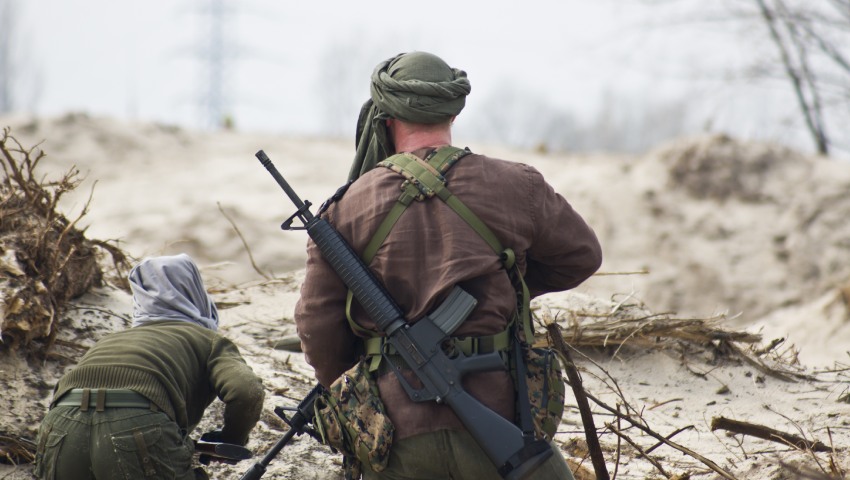The US withdrawal from Afghanistan has paved the way for a Pakistan-backed Taliban and an opportunistic China to establish a foothold in the region, according to one analyst.
To continue reading the rest of this article, please log in.
Create free account to get unlimited news articles and more!
In recent months, the US and allied nations, including Australia, have drawn down their military presence in Afghanistan, marking an end to a 20-year war, initially sparked by the 9/11 terrorist attacks in New York City.
US President Joe Biden has insisted that the time was right to withdraw troops from the embattled country, claiming the mission has been accomplished.
“The United States did what we went to do in Afghanistan: to get the terrorists who attacked us on 9/11 and to deliver justice to Osama Bin Laden, and to degrade the terrorist threat to keep Afghanistan from becoming a base from which attacks could be continued against the United States,” he said.
“We achieved those objectives. That’s why we went.
“We did not go to Afghanistan to nation-build. And it’s the right and the responsibility of the Afghan people alone to decide their future and how they want to run their country.”
However, the administration has come under fire for his decision, with many fearing that extremist elements would seek to exploit the void and overthrow the governing authority established under the US presence.
Such concerns have been validated by an aggressive military campaign from the Taliban, with the fundamentalist group swiftly seizing control of over a quarter of the country’s districts.
According to Brahma Chellaney, professor of strategic studies at the New Delhi–based Centre for Policy Research, Afghanistan is “on the brink of catastrophe”.
“The Taliban are pushing towards Kabul, and the United States is looking weaker than ever,” he writes in ASPI’s The Strategist.
Chellaney argues that President Biden’s swift withdrawal has effectively handed power back to the Islamist militia, which in turn, undercuts global trust in the US, undermines regional security, and risks triggering a resurgence in terrorist activity around the world.
“The Taliban’s impending return to power will surely energise and embolden other terrorist groups in the larger global jihadist movement,” he continues.
A Taliban-dominated Afghanistan, he says, would ultimately be under Pakistan’s control, noting that the terrorist group continues to be propped up by Pakistani Inter-Services Intelligence.
This would put India at risk, given the Taliban’s record of enabling Pakistan to use its territory to train terrorists for missions in India.
“The group’s return to power could thus open a new front for terrorism against India, which would then have to shift its focus from the intensifying military standoffs with China in the Himalayas,” Chellaney adds.
Chellaney also warns of a larger scale geopolitical threat sparked by the power vacuum in Afghanistan.
He warns that opportunistic China could look to make strategic inroads in the region, leveraging Afghanistan’s mineral wealth and geographical location between Pakistan and Iran.
“China would achieve this by offering the Taliban the two things they desperately need — international recognition and economic aid,” he notes.
“With Russia also likely to recognise the Taliban’s leadership in Afghanistan, the group will have little incentive to moderate its violence, despite its current attempts to polish its image.”
In light of these risks, Chellaney claims Biden should have maintained a small residual force in Afghanistan, in order to provide critical air support and reassurance to Afghan forces.
“Yes, that would have violated the deal Biden’s predecessor, Donald Trump, struck with the Taliban in February 2020. But the Taliban have already violated that Faustian bargain,” he writes.
The US’ development of a counterterrorism over-the-horizon capability to compensate for a lack of physical presence in the region, would fall short of countering the Taliban and its backers, Chellaney adds.
“The more likely scenario will be an emergency evacuation of US embassy personnel and other American citizens from Kabul, much like the evacuation from Saigon in 1975,” he claims.
“India, for one, has already begun such an exodus, evacuating its consulate staff from Kandahar.”
Chellaney concludes by quoting Robert Gates, former secretary of defence under presidents George W. Bush and Barack Obama, who stated that President Biden “has been wrong on nearly every major foreign policy and national security issue over the past four decades”.
“The hurried US withdrawal from Afghanistan is set to extend that pattern.”
Get involved with the discussion and let us know your thoughts on Australia’s future role and position in the Indo-Pacific region and what you would like to see from Australia's political leaders in terms of partisan and bipartisan agenda setting in the comments section below, or get in touch with
Charbel Kadib
News Editor – Defence and Security, Momentum Media
Prior to joining the defence and aerospace team in 2020, Charbel was news editor of The Adviser and Mortgage Business, where he covered developments in the banking and financial services sector for three years. Charbel has a keen interest in geopolitics and international relations, graduating from the University of Notre Dame with a double major in politics and journalism. Charbel has also completed internships with The Australian Department of Communications and the Arts and public relations agency Fifty Acres.

 Login
Login








